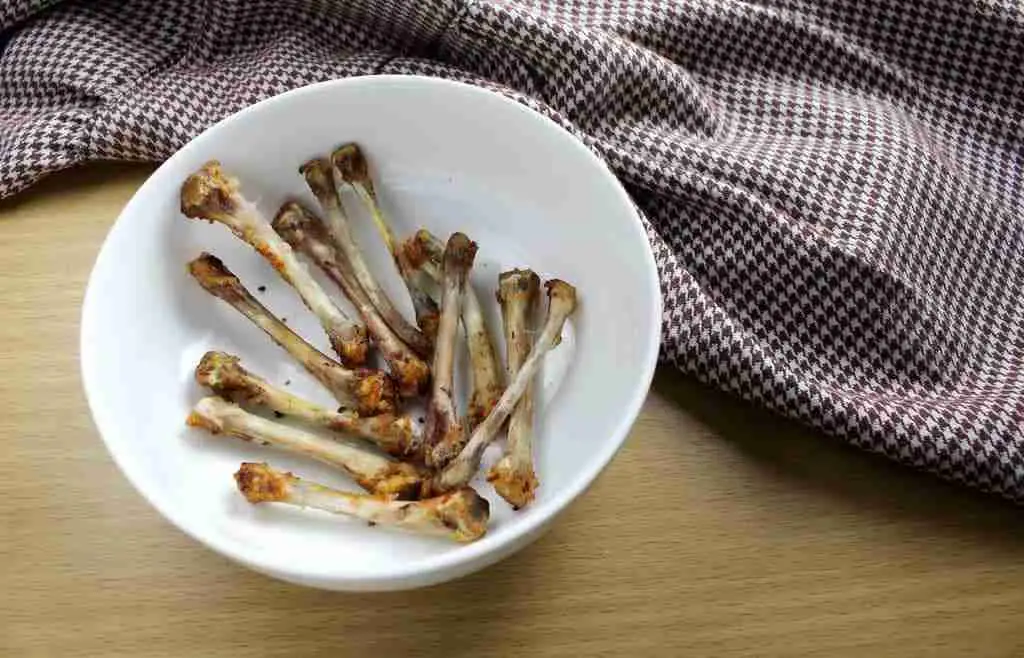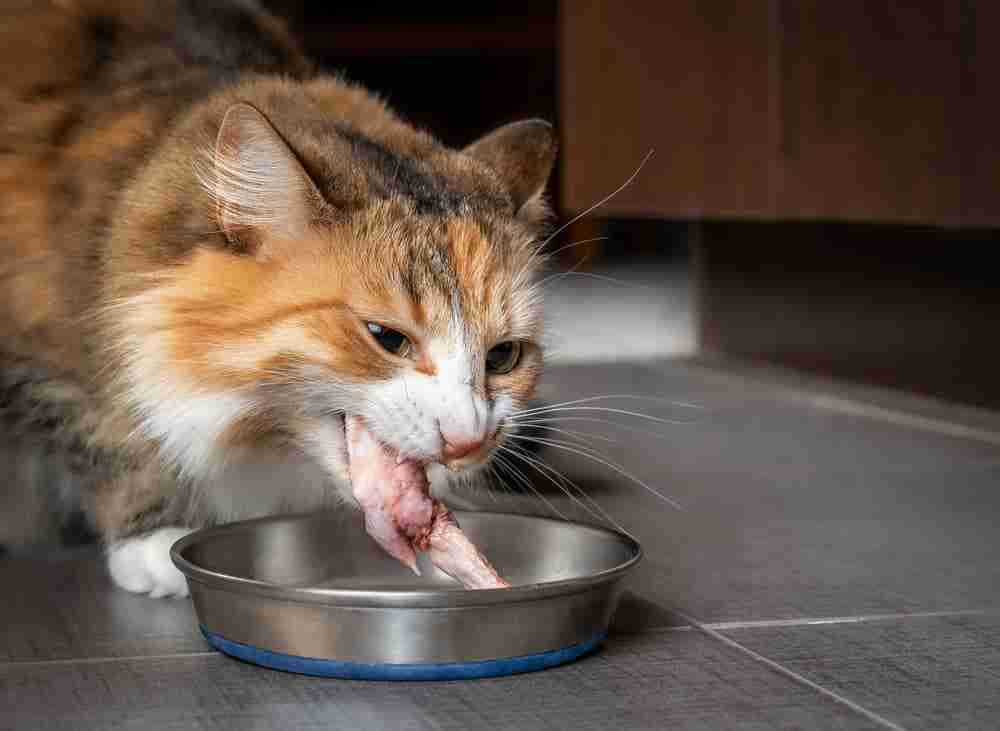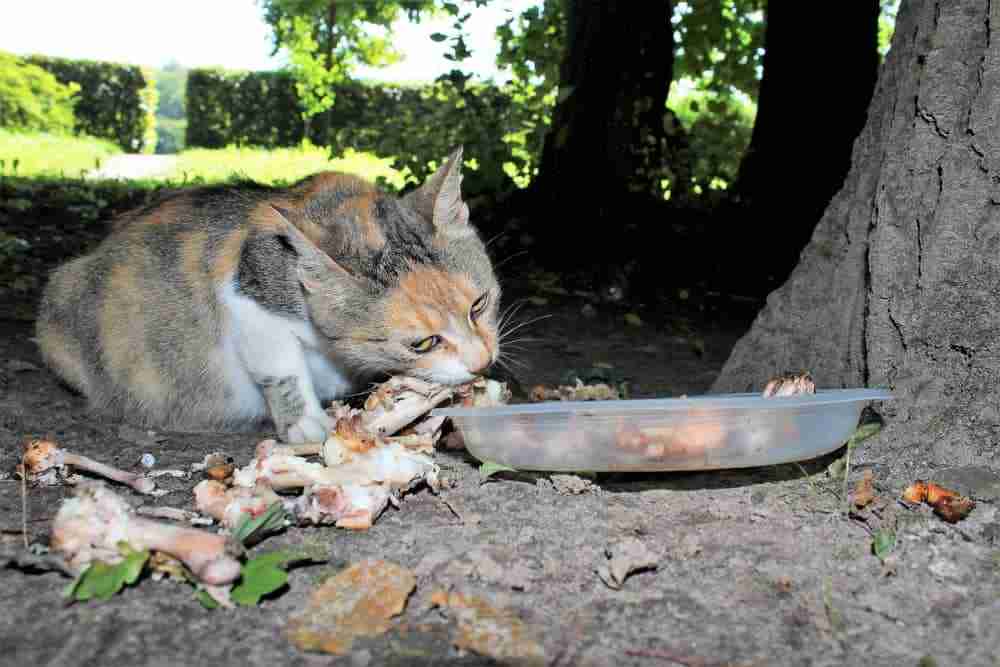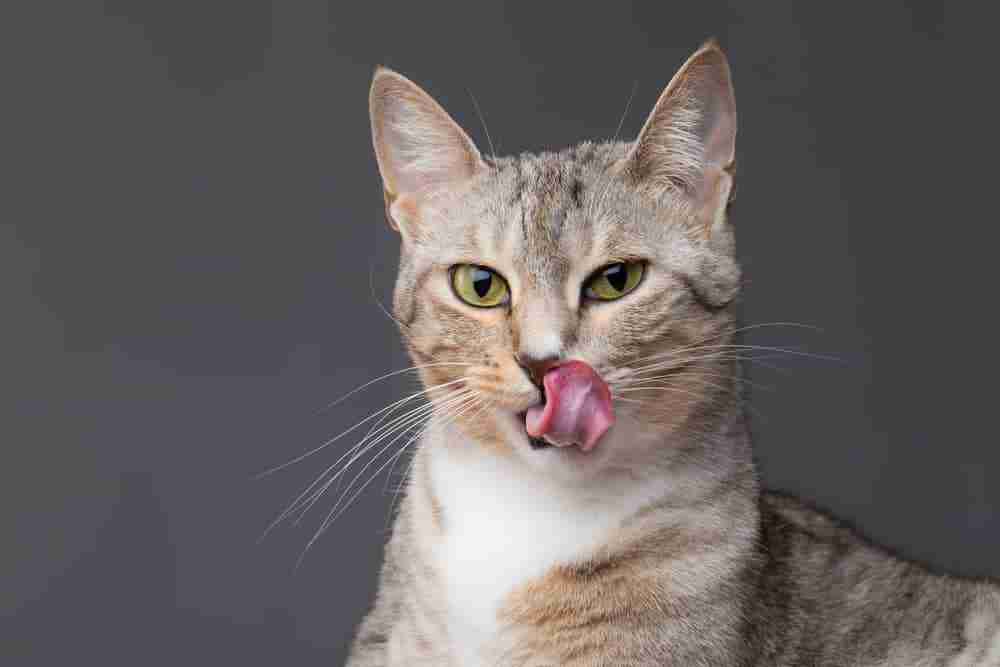Most people know that you shouldn’t give dogs chicken bones but can cats eat chicken bones? Are they dangerous or is there actually some benefit to cats if they do eat chicken bones? Lets check it out.
Felines are obligate carnivores; in other words, they meet their nutritional requirements by eating other animals and their protein needs are higher than other types of mammals. Meat provides cats with the essential nutrients that they need in order to thrive, such as taurine, vitamins A and B12, and arachidonic acid that plants don’t contain, and if these nutritional requirements aren’t met, they can suffer from serious health problems, such as heart and liver issues, irritated skin, and even loss of hearing.
Of all the different types of meat that cats eat, birds are among their favorite. Wild cats are hunters and seek out birds, eating not only their meat, but their bones, too. Domestic cats have the instinct to hunt, too (has little Fluffy ever gotten out and left a dead bird at your doorstep as a gift?) In fact, because cats are naturally obligate carnivores, if you want your kitty to be as healthy as possible, you should ditch the kibble and feed her a raw food diet.
The issue with a raw food diet that many cat parents have, however, is that things can get very expensive very quickly. Fortunately, there’s a way that you can feed your fluff-ball meat in its natural state without having to spend a lot on raw animal meat and organs. How? – By supplementing her diet with highly nutritious morsels, such as chicken bones.
Can Cats Really Eat Chicken Bones?
You might be saying to yourself, “Wait a second… aren’t chicken bones dangerous for cats?” The truth is that yes, chicken bones can be really healthy for felines, but you need to make sure that you’re only offering raw chicken bones. Why raw bones only? Because, as we mentioned, felines are obligate carnivores and consume the meat and bones of the animals that they hunt, and like in nature, cats don’t cook the meat and meat by-products that they consume; they eat them raw. While your pet kitty can eat cooked chicken, they shouldn’t eat cooked chicken bones. Though they may find them tasty, they can be downright dangerous.

Why Are Cooked Chicken Bones Dangerous?
Though technically, cats can eat cooked chicken bones, there are several hazards associated with them that can impact the health and well-being of your furry friend; in fact, there’s even a chance that they could be lethal.
They’re Brittle
As chicken bones are cooked, they dry out and become soft and brittle. As such, when your feline companion consumes cooked bones, they can break off into small pieces, get trapped in her throat, and become a choking hazard. They could also tear up her mouth and her gastrointestinal tract, potentially causing internal bleeding and blockages.
They can Be Toxic
When you cook chicken, you probably add spices, herbs, marinades, and other ingredients to make it more flavorful. While doing so might be a taste sensation for you and won’t cause adverse side effects, for your feline companion, those added ingredients can be dangerous. That’s because many herbs, spices, and other ingredients that humans consume are toxic for cats; for example, onion and garlic powders can make a cat sick and in high doses, they could be lethal. When you marinate and cook chicken, those ingredients are absorbed in the bones.
The Benefits of Raw Chicken Bones for Felines

So, why are raw chicken bones good for cats? They’re a great source of essential vitamins and minerals that your cat needs to thrive. Plus, raw chicken bones can be beneficial for a cat’s oral health.
Calcium
Raw chicken bones are packed with calcium, a vital nutrient that strengthens bones and teeth in all mammals, including felines. As such, by feeding your cat raw chicken bones, you’ll help to strengthen her bones and teeth. Additionally, raw chicken bones contain other important vitamins and minerals, including vitamin A, vitamin D, and vitamin E, as well as copper and zinc, which play an important part in brain and muscle health and support healthy organs, including the heart.
Improved Oral Health
A lot of people think that eating or chewing bones would be bad for a feline’s oral health, as it might seem like they would tear up the gums, tongue, and roof of their mouth, in reality, they can actually support good dental hygiene. That’s because bones are hard, and as your cat chews on bones, they will not only remove plaque buildup but can also strengthen the tooth enamel.
What to Do if Your Cat Eats Cooked Chicken Bones
Felines are curious creatures. They can rummage in the garbage or sneak their way up onto a countertop or table and steal any food that they find. If you’ve found that your kitty has gotten to a piece of cooked chicken that contains bones, don’t panic, but do keep a close watch over her for a few days, as there’s a chance that she could develop a laceration or a blockage in her gastrointestinal lining, serious issues that can take a while to exhibit signs. Signs of a laceration or blockage include:
- Vomiting
- Diarrhea
- Bloating in the abdominal region
- Blood in the stool
- Gas
- Lethargy
- Pieces of bone in her stools
If you notice any of the above-mentioned symptoms, or if it seems like your cat isn’t interested in eating or she just seems to be acting strange, make an emergency appointment with your vet right away. If your feline does develop complications as a result of eating cooked chicken bones, not only could she suffer serious and lasting side effects, but there’s even a chance that she could perish. Let your vet know what happened and he or she will perform a complete assessment of your kitty. In the event that she is suffering from a gastrointestinal blockage or internal bleeding, she may require emergency surgery to correct the matter. Do note that this isn’t always the case and that if your cat does eat raw chicken bones, it’s likely that she will recover on her own, but you shouldn’t leave it to chance, so having her checked out as soon as possible is an absolute must.

How to Feed Your Cat Raw Chicken Bones
When you’re feeding your cat raw chicken bones, don’t just give her any bone; make sure that you select bones that are properly sized for her mouth. It should be large enough for her to gnaw and chew on, but it shouldn’t be so large that she can’t handle it. Likewise, the bones shouldn’t be so small that she could swallow them whole, as that could lead to issues, too, such as a blockage. The bones of a chicken wing are an example of the size that’s perfect for a cat, as they’re not only appropriately sized to fit in a cat’s mouth, but they aren’t so small that she’ll swallow them right down.
It’s important to note that when you’re feeding your cat raw chicken bones, you should always be mindful of her. It’s a good idea to be present and supervise her consumption of raw bones so that in the event she does chock or develop any other issues, you can administer any care that might be necessary.
Instead of whole chicken bones, you might want to consider giving her bones that have been ground up. Visit your local butcher or the meat department at your local grocery store and inquire about “meat sawdust”, the dust that occurs when a butcher cuts chunks of meat into sections. You can mix the “meat sawdust” into dry kibble or wet food so that she can enjoy all of the essential vitamins and minerals that bones provide.
Summing It Up
Can cats eat chicken bones? Yes, chicken bones can be an excellent addition to your cat’s diet. If you’re going to feed your feline companion chicken bones, just make sure that they’re raw and are appropriately sized, or opt for ground-up bone instead.
